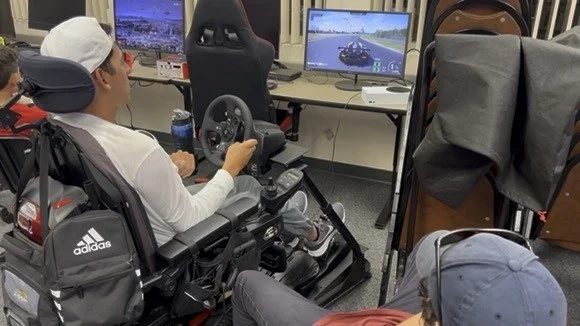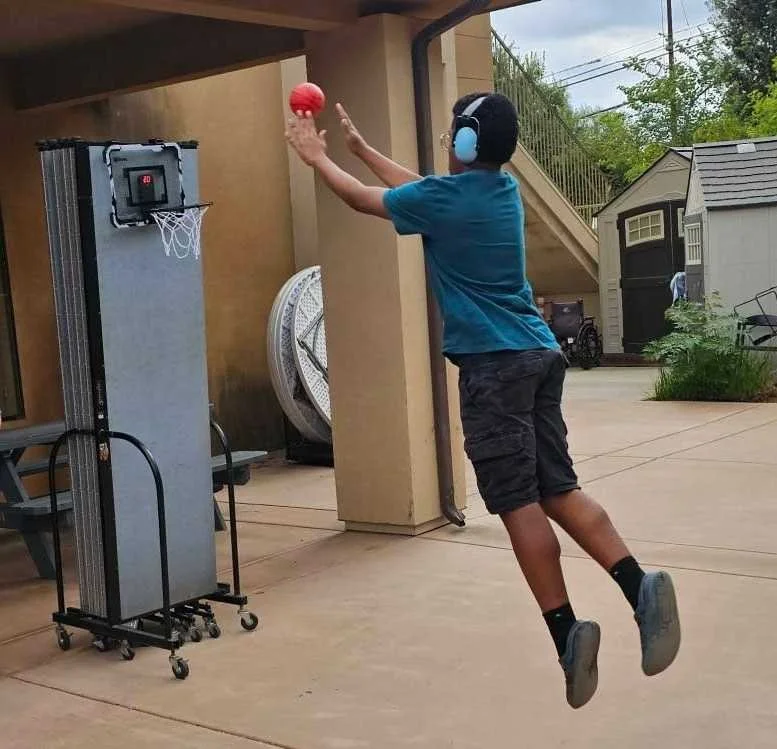Why Video Games Are Powerful Tools for IDD Growth
Video games get a bad reputation, but high-quality, intentionally used games can be powerful tools for social, emotional + cognitive growth, especially when paired with IDD-informed coaching.
Research backs this up:
A 2024 scoping review of game-based social skills programs for autistic youth found that every single included study reported improvements in social skills when games were used as part of structured interventions.
In one of the most well-known game-based social skills programs, Secret Agent Society, 76% of children showed marked, sustained improvements in emotional control + social interactions after the intervention.
A large study of nearly 2,000 children found that those who played video games 3+ hours per day performed faster + more accurately on tests of working memory + impulse control than children who never played, suggesting that some types of gaming may train core cognitive skills.
Other reviews have found that digital cognitive + social games can help autistic children better recognize facial expressions + improve communication, especially when games are designed with social goals in mind.
At UESL, we build on this growing evidence by:
Choosing specific games to build specific skills
Embedding them in a structured daily program
Pairing gameplay with clear goals, coaching cues + debriefs
Let’s walk through some of the tools you’ll see inside a UNIFIED Technology Center.
From Couch Co-Op to Communication Lab: Overcooked 2 at UESL
If you’ve ever played Overcooked 2, you know it’s chaotic in the best way: you and your teammates are running a tiny kitchen, racing timers, and trying not to burn the soup while the floor moves underneath you.
In our program, that chaos becomes a communication laboratory.
WHY OVERCOOKED 2?
The mechanics force players to:
Share information quickly (“Onions next!”, “Dishwasher is full!”)
Divide roles (“You chop, I cook, you plate.”)
Adjust when things go wrong (missed orders, dropped ingredients)
Practice staying calm under time pressure
Well-designed cooperative games like this have been shown to support social skills such as turn-taking, coordination + collaboration. Studies of collaborative tablet + console games for autistic youth show that cooperative games can foster “membership, partnership + friendship” behaviors without losing the fun that keeps players motivated.
Online + multiplayer gaming has also been linked to improved communication + cooperative skills when used intentionally, especially for neurodivergent gamers who may find structured digital environments more predictable than face-to-face social settings.
HOW UESL USES IT
In a UNIFIED Technology Center, you might see a pod of clients in Overcooked 2 with a coach guiding:
Pre-game goal setting
“Today we’re practicing asking for help instead of getting frustrated when we get stuck.”In-game prompting
“Try calling out what you’re doing before you move. Who’s taking the dishes?”Post-game debrief
“What helped your team get back on track after that burnt order? How did it feel when your teammate encouraged you?”
Over time, those small moments build real-world skills: using a calm voice under pressure, advocating for needs, listening to teammates, feeling proud of contributing to a team.
UESL Exclusive Tools: Technology That Translates to Real Life
While games like Overcooked 2 build communication + collaboration, UESL also invests in specialized technology that directly supports client goals outside the program — especially independence, mobility, and health.
1. DRIVING SIMULATORS: Practicing Independence in a Safe Space
For many IDD individuals, driving is about far more than transportation. It’s independence, community access + confidence.
That’s why our UNIFIED Technology Centers incorporate driving simulators as part of some clients’ Individualized Technology Education Plans (ITEPs).
Research shows this is more than “just practice”:
Virtual reality driving simulation for autistic youth has been shown to significantly improve both driving skills and executive function compared with traditional road training alone.
Simulator-based training for individuals with developmental disabilities has been associated with measurable gains in lane position, speed control, braking + hazard detection.
In one report focused on teens with autism, about 1 in 3 teens with ASD obtained a driver’s license by age 21, and 63% of parents said their teen either already drives or plans to drive. Driving simulators were highlighted as a tool that helps these teens improve skills and identify areas needing more focus.
At UESL, our coaches work alongside clients who may be:
Preparing to earn a license for an assistive or adaptive vehicle
Building tolerance for traffic situations in a controlled, low-stress environment
Practicing turn-taking, attention, and reaction time with realistic but safe scenarios
For some clients, time in the simulator — paired with coaching, repetition, and support at home — has contributed to life-changing victories like passing a driving test, using an assistive vehicle more independently, and feeling confident enough to access work, school, or community activities.
2. EXERGAMING + MOVEMENT: Healthy Body + Healthy Mind = Good Gamer
UESL’s Healthy Gamer motto is simple: Healthy Body + Healthy Mind = Good Gamer.
We use exergaming (movement-based video games + digital activities) to support physical health, regulation, and overall wellness. Think:
VR sessions that require whole-body movement
Gamer geared stretches + breathing exercises
Group games + outdoor activities to practice coordination and social skills
Research has shown:
Digital technologies and exergaming are a promising option to promote physical activity, fitness, motor skills + cardiovascular performance in individuals with intellectual + developmental disabilities, including children with Down syndrome and autism.
Stationary bike-based VR exergaming can improve locomotor motor skills in children with developmental disabilities.
Inside a UNIFIED Technology Center, that science turns into:
Clients steering through virtual worlds while working on endurance + balance
Coaches quietly tracking progress on ITEP goals like “participates in 15 minutes of sustained movement” or “uses guided breathing after intense play”
Gamers discovering that their favorite activity (gaming) can also be a wellness tool, not just a sedentary hobby
3. INNOVATIVE TECHNOLOGY: Turning Passion Into Real-World Skills
Beyond games and simulators, UESL uses:
Video editing software
Music production tools
Graphic design + digital art programs
Content creation workflows (storyboarding, scripting, recording)
For many IDD individuals, these tools do more than teach “tech skills” — they provide a medium for:
Self-expression (telling their story, sharing interests)
Executive functioning practice (planning, sequencing, revising)
Vocational exploration (seeing how gaming + technology intersect with real careers)
These creative tools are woven into the ITEP, so what happens in our labs connects back to goals at home, school + in the community.
Team Tournaments: Safe, Structured Competition for IDD Gamers
Competition can be scary — especially for individuals who’ve experienced bullying, exclusion, or failure in traditional sports. At UESL, we’ve designed team tournaments that center:
Safety
Sportsmanship
Emotional regulation
Belonging
HOW WE STRUCTURE TOURNAMENTS
During a tournament day, you might see:
Pod-based teams carefully built by coaches to balance support needs, communication styles, and strengths
Clear pre-game expectations about kindness, cheering for teammates, and handling wins + losses
Coaches watching closely for overload, helping clients use coping strategies, and modeling healthy competitive behavior
A post-tournament debrief, where clients talk through what felt hard, what they’re proud of, and what they’d like to try next time
This mirrors what research is telling us about structured, gamified social interventions:
Reviews of gamified programs for social interaction consistently highlight that game elements like levels, teamwork, feedback + cooperative goals can enhance engagement in social skills training.
Physical activity + group play are frequently linked to improved social functioning for autistic individuals across dozens of studies.
Our tournaments aren’t about finding “the best gamer.” They’re about helping IDD individuals practice:
Trying something new
Supporting others
Handling intense emotions
Feeling what it’s like to be seen, included + celebrated
What Makes UESL Different
UESL combines research-informed tools + deeply intentional design.
Here’s what sets us apart:
1. IDD-INFORMED COACHING
Every UNIFIED coach completes IDD-informed training modules and ongoing professional development so they can:
Recognize signs of overwhelm, anxiety, or shutdown
Use visual supports, clear routines + predictable structures
Scaffold communication for non-speaking or minimally speaking clients
Connect gameplay moments to real-world contexts (“That same patience you used in the match is what helped you wait in line at the store yesterday.”)
2. THE INDIVIDUALIZED TECHNOLOGY EDUCATION PLAN (ITEP)
UESL’s ITEP is our unique adaptation of the traditional IEP — built specifically around gaming + technology.
For each client, our team collaborates with families + care teams to outline:
Social, emotional, physical + vocational goals
Specific games + tools (like Overcooked 2, driving simulators, exergames, editing software) chosen to support those goals
How we’ll track progress inside the program + notice changes at home or school
3. ACCESSIBLE, SDRC-APPROVED PROGRAMMING ACROSS SAN DIEGO + IMPERIAL VALLEY COUNTIES
UESL is an approved vendor of the San Diego Regional Center (SDRC), which allows us to provide our program at no cost to SDRC clients, ages 8–adult.
Our UNIFIED Technology Centers across San Diego + Imperial Counties are designed for:
Making friends
Playing on a team
Building social + emotional skills
Exploring technology in a safe, supported, truly inclusive space
If You’re an IDD Individual/Family…
You Don’t Have to Navigate This Alone
If you are an IDD individual, a parent, guardian, or family member, or a case manager looking for research-backed, technology-based support in San Diego or Imperial Counties, we want you to know:
You deserve safe, joyful, structured spaces where technology is used to build real-world skills.
You deserve a team that understands IDD, partners with SDRC, and believes gaming + technology can be tools for connection, confidence + independence.
📍 Explore our locations: Visit unifiedesl.com/locations to find a UNIFIED Technology Center near you.
📧 Connect with our Client Services team: Reach out through our contact page or email our concierge client services team to ask questions, talk through options, and get support with next steps.
🤝 Bring your questions: If you’re unsure whether UESL is the right fit, we’ll walk you through the process, help you talk with your SDRC service coordinator, and explore what an ITEP could look like for you or your loved one.









